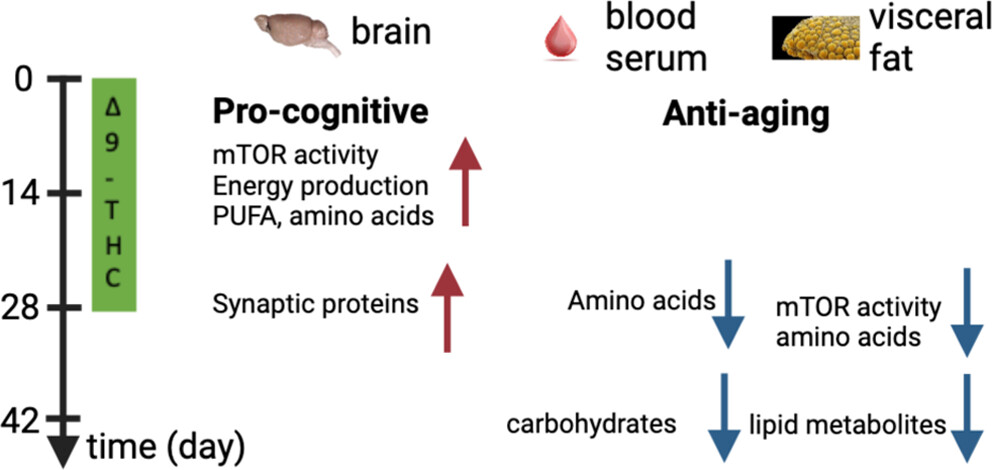Long-term, low-dose THC can improve cognitive decline in mice
Long-term, low-dose THC can improve cognitive decline in mice

One of the hallmarks of aging is cognitive decline. New research in mice shows 1 that long-term administration with tetrahydrocannabinol (THC), the primary psicoactive component of marihuana, at low doses can have antiaging-effects, particularly on cognitive decline.
The endocannabinoid system (ECS) regulates various bodily and brain functions, including sleep, memory and learning, the immune system and even metabolic function. THC binds the cannaboid receptor 1 (CB1), a component of the ECS highly present in the brain. In mice, loss of CB1 can increase the negative impact of aging on brain function, including memory or learning.
In this new research, scientists from Germany and Israel administered young (4-month-old) and old (18-month-old) mice either with placebo or low-dose THC for a month. Over the study period, both metabolic and indicators of brain function were measured. In particular, the team wanted to learn how THC impacts the function of mTOR, an element of signalling pathways involved in various cellular functions.

In older mice, THC administration resulted in a temporary but significant increase in mTOR activity, particularly in the hyppocampus, a brain region related to learning and memory and which translated into higher levels of proteins involved in synaptic transmission, that is, there was more material available to generate new memories/thoughts.
In addition, the treatment decreased mTOR levels in their fat tissue and reduced plasma levels of amino acids and carbohydrate metabolites, an effect typically observed in low-calorie diets or after intense physical activity.
Based on their results, the effects of THC in aging mice is dual. Initially, it increases mTOR expression in the brain, improving the metabolism and increasind the production of synaptic proteins, which could improve cognitive function in mice and later having other anti-aging effects in peripheral tissues by decreasing mTOR expression and the metabolic rate.
However, this study has some limitations. First, and most importantly, it is a study in mice, and humans are no mice, so translation of the results to humans to inform therapy requires human clinical trials. In addition, it is unclear which is the ideal dosage and duration of the observed effects. Nonetheless, the results are promising in that they open an avenue for interventions aiming to decrease the societal and personal impact of cognitive decline in old age.
References
- Andras Bilkei-Gorzo, Britta Schurmann, Marion Schneider, Michael Kraemer, Prakash Nidadavolu, Eva C. Beins, Christa E. Müller, Mona Dvir-Ginzberg & Andreas Zimmer (2024) Bidirectional Effect of Long-Term Δ9-Tetrahydrocannabinol Treatment on mTOR Activity and Metabolome ACS Pharmacol. Transl. Sci. doi: 10.1021/acsptsci.4c00002 ↩